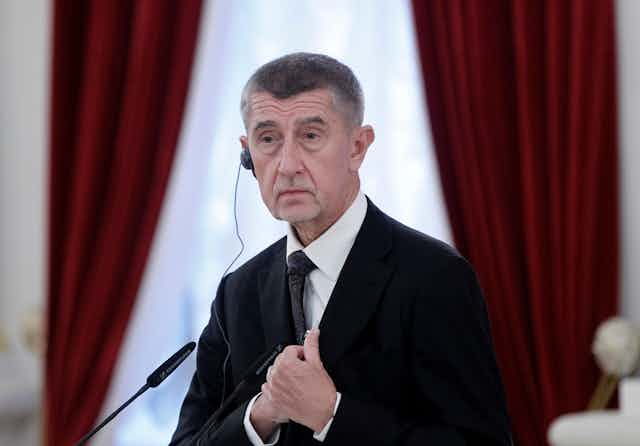With just days to go before a national election, the name of the Czech prime minister, Andrej Babiš, appeared in the Pandora papers, a massive leak of documents exposing the secret financial transactions of multiple world leaders, among others. The papers reportedly show that Babiš purchased a mansion in France worth £13 million via secret loans through offshore companies before he entered politics.
But this new scandal is unlikely to dent Babiš’ grip on power. It is as yet unclear whether the prime minister did anything illegal. And his involvement in a number of other scandals has not put off his support base. The key question remaining is not whether his career will be hurt by these accusations, but whether their fallout will further fuel the Czech Republic’s drift towards illiberalism like Hungary and Poland.
An informant of the political police (STB) under communism, Babiš is now the fifth richest Czech, worth an estimated US$3.5 billion (£2.6 billion). Through a trust fund, he owns Agrofert, a large conglomerate of 300 companies said to be the main Czech beneficiary of the European Union’s (EU) agricultural subsidies. This represents a major conflict of interest since Babiš and his ministers take part in decision-making over the European budget and the rules through which subsidies are allocated. In response, the European Commission has suspended some of the payments destined for Czech companies until the conflict of interest is resolved.
At home, Babiš faces allegations that he illegally obtained a €2-million EU subsidy to build a resort in the so-called Stork’s Nest affair, fraudulent use of advertisement for tax evasion, and involvement in the kidnapping of his own son to Crimea. He has denied any wrongdoing in these cases.
In addition, the ruling coalition of Babiš’ party ANO and the Social Democrats (ČSSD) mismanaged the pandemic, the Czech Republic having one of the worst COVID-related death tolls in the world.
While any one of these matters would once have ended the career of a Czech prime minister, Babiš can count on the unconditional support of his Berlusconi-style party, which is built around his personal brand and largely made up of his employees. And, helpfully, Babiš’ conglomerate controls about one-third of the Czech private media.
What’s more, the government’s extravagant expenditure, contributing to the second-fastest debt growth rate in the EU, has made ANO a favourite among pensioners, the nation’s most reliable voters.

High stakes
The October 8-9 election is arguably the most important legislative contest since the Czech Republic’s independence in 1993. Never before has there been an incumbent with so many incentives to win as Babiš, nor anyone with quite so much power to change the long-term democratic and pro-western trajectory of the Czech political system.
It was notable to see Babiš invite the Hungarian prime minister, Viktor Orbán, on the Czech campaign trail. Walking in the illiberal footsteps of Hungary and Poland’s ruling parties may be appealing to Babiš in light of looming conflict with European institutions.
As things stand, he is on course for a nearly unsolvable standoff with the EU. His options appear to be to get rid of Agrofert, which looks extremely unlikely, or to resign and hand over the premiership to a trusted person from his party – potentially attempting to run for president in the next presidential election scheduled for January 2023. This is, however, a risky strategy. Babiš may not win, the trusted person may prove less reliable than expected and, in the meantime, Babiš would be more vulnerable to police investigations.
Babiš thus may consider another more radical scenario: extricating the country from its EU membership. Domestically, such a move would please the current president, Miloš Zeman, and several political parties who have been calling for “Czexit”. Abroad, Babiš can team up with Orbán and Jarosław Kaczyński of Poland, whose autocratic ambitions are also increasingly constrained by the pressure of European institutions.
Moreover, the Czech Republic’s economic growth means that the country will gradually benefit less from the EU’s budget, becoming a net contributor by 2030. This will gradually transform one of the most popular arguments for membership into a reason for quitting.
Reassuringly, there will be several obstacles to illiberal developments, including the Czech senate. The upper house is controlled by the opposition, without whose support any constitutional reform is impossible. The extreme scenario of leaving the EU is also made even more daunting by the frightening precedent set by the UK’s messy departure. But it may nonetheless emerge as the only path for Babiš to stay in power, avoid being jailed and keep his businesses afloat.
Many variables remain unknown, including the potential for post-election party bargaining and the fragile health of Zeman, not to mention his unpredictable behaviour. The importance of this election cannot be overstated. It may well decide whether the Czech Republic will maintain reasonable democratic standards or sets off on a path towards an illiberal future – one that may lie outside the EU.

